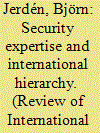| Srl | Item |
| 1 |
ID:
180446


|
|
|
|
|
| Summary/Abstract |
While the profile of China has been growing in Europe in recent years, COVID-19 has put the country at the center of the attention of both policymakers and the general public. Because of this shift, the role of public opinion may be more important than ever in orienting the strategic choices that the European Union (EU) faces in its China policy. However, we lack a systematic understanding of European attitudes toward China and the role that Chinese public diplomacy plays in shaping them. As such, this article addresses two research questions. First, what was the content and style of China’s public diplomacy in the EU during the pandemic? Second, what did European public opinion of China look like during the pandemic? To tackle these questions, we use a mix of qualitative and quantitative methods, including our own extensive public opinion data, to focus on ten representative EU member states. Through our research, we find a visible correlation between the intensity, style, and content of China’s public diplomacy in Europe during COVID-19 and European public opinion on China. Future research could further explore this link and try to establish and test the casual direction.
|
|
|
|
|
|
|
|
|
|
|
|
|
|
|
|
| 2 |
ID:
153259


|
|
|
|
|
| Summary/Abstract |
Many states partially relinquish sovereignty in return for physical protection from a more powerful state. Mainstream theory on international hierarchies holds that such decisions are based on rational assessments of the relative qualities of the political order being offered. Such assessments, however, are bound to be contingent, and as such a reflection of the power to shape understandings of reality. Through a study of the remarkably persistent US-led security hierarchy in East Asia, this article puts forward the concept of the ‘epistemic community’ as a general explanation of how such understandings are shaped and, hence, why states accept subordinate positions in international hierarchies. The article conceptualises a transnational and multidisciplinary network of experts on international security – ‘The Asia-Pacific Epistemic Community’ – and demonstrates how it operates to convince East Asian policymakers that the current US-led social order is the best choice for maintaining regional ‘stability’.
|
|
|
|
|
|
|
|
|
|
|
|
|
|
|
|